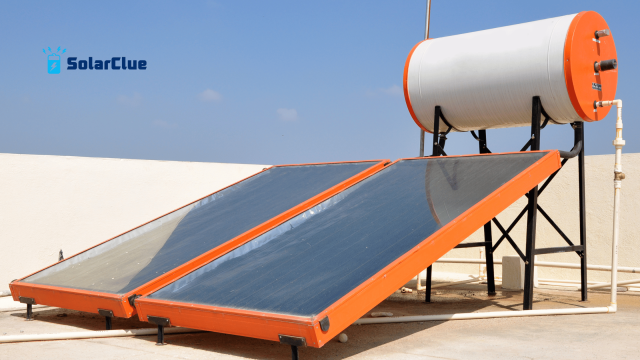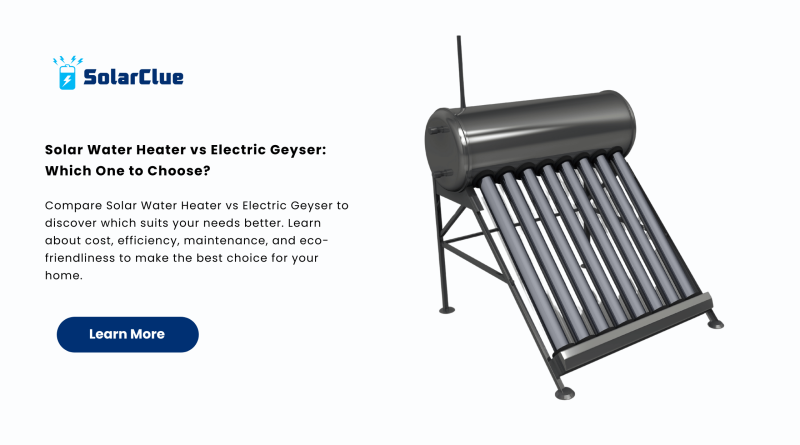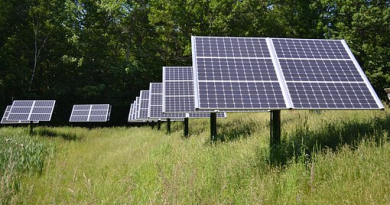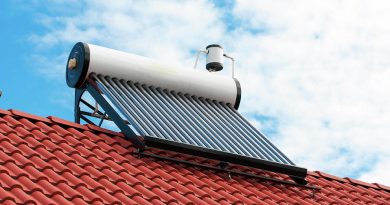Solar Water Heater vs Electric Geyser: Which One to Choose?
Choosing the right water heating system is essential for comfort, energy efficiency, and long-term savings. Two popular options in India are the Solar Water Heater and the Electric Geyser. While both serve the same purpose—providing hot water—they differ significantly in how they operate, how much they cost, and their environmental impact. This blog will help you understand the key differences and decide which one is better suited to your needs.
Table of Contents
- 1 What is a Solar Water Heater?
- 2 What is an Electric Geyser?
- 3 How Do They Work?
- 4 Efficiency and Performance
- 5 Cost Comparison
- 6 Environmental Impact
- 7 Maintenance and Lifespan
- 8 Installation Requirements
- 9 Safety
- 10 Government Incentives
- 11 When Should You Choose a Solar Water Heater?
- 12 When Should You Choose an Electric Geyser?
- 13 Real-Life User Experiences
- 14 Final Verdict
- 15 Conclusion
- 16 FAQs
What is a Solar Water Heater?
A Solar Water Heater uses solar energy to heat water. It includes solar collectors, usually installed on the roof, which absorb sunlight and convert it into heat. This heat warms the water stored in a well-insulated tank. These systems are highly efficient in areas that receive good sunlight year-round and can significantly reduce electricity usage.
What is an Electric Geyser?
An Electric Geyser is a conventional water heating device that uses electricity to heat a coil or heating element. This heated element transfers energy to the water in the tank or flowing through the unit. Electric geysers are popular in cities due to their compact size, quick heating ability, and ease of use.
How Do They Work?
Solar Water Heater Operation
Solar water heaters use rooftop collectors to absorb sunlight. The absorbed heat is transferred to the water in the storage tank. Some systems also use a pump to circulate the water, while others rely on gravity. Many models come with a backup electric heater for cloudy days.
Electric Geyser Operation
Electric geysers operate by running electricity through a heating element inside the tank. Once powered on, the element heats up quickly and starts warming the surrounding water. The water stays hot until the thermostat turns the heating element off.
Efficiency and Performance
Solar Water Heater
A well-installed Solar Water Heater is extremely efficient in sunny areas, with energy efficiency rates ranging from 60% to 80%. It works best in homes with good rooftop exposure and can supply enough hot water for the entire household.
Electric Geyser
Electric Geysers heat water quickly and are unaffected by weather conditions. However, they consume a significant amount of electricity, which adds to your monthly power bill. In terms of long-term energy efficiency, solar heaters outperform them.
Cost Comparison
Initial Cost
Installing a Solar Water Heater usually requires a higher upfront investment, ranging from ₹15,000 to ₹60,000 depending on capacity and brand. However, this can be offset by government subsidies.
Electric geysers are less expensive initially, with prices starting as low as ₹3,000 for basic models. However, they do not qualify for government subsidies and can be costly in the long run due to power consumption.
Running Costs
Once installed, the operational cost of a solar heater is nearly zero. The sun’s energy is free, and only occasional maintenance is needed.
In contrast, electric geysers increase your electricity bill each month, especially during winter when hot water usage is high.
Environmental Impact
Choosing a Solar Water Heater is a step toward sustainable living. It reduces dependency on non-renewable energy and lowers carbon emissions. It also supports the growth of green technology.
Electric geysers, on the other hand, depend entirely on electricity—most of which is still generated from fossil fuels in India—making them less eco-friendly.
Maintenance and Lifespan

Solar Water Heaters typically require less frequent maintenance. Occasional cleaning of the solar collectors and an annual checkup is sufficient to keep them running efficiently for over 15-20 years.
Electric Geysers tend to have a shorter lifespan of about 8-10 years and require regular maintenance due to scale buildup and corrosion in hard water conditions.
Installation Requirements
Installing a solar heater requires adequate rooftop space and good sunlight exposure. It’s ideal for independent homes, villas, and buildings with shared roof access.
Electric geysers are easy to install in any bathroom and don’t require external infrastructure. This makes them suitable for apartments and rented accommodations.
Safety
Solar heaters are inherently safe, as they don’t involve high-voltage components. Most systems come with temperature control and an electric backup with safety switches.
Electric geysers can pose a safety risk if not installed or maintained correctly. Overheating, thermostat failure, or electrical short circuits can lead to accidents.
Government Incentives
In India, the government supports solar adoption through various subsidy programs under the Ministry of New and Renewable Energy (MNRE). These can significantly reduce the cost of installing a Solar Water Heater.
For more on subsidy eligibility and schemes, check out solarclue.com.
When Should You Choose a Solar Water Heater?
-
You live in an area with plenty of sunlight.
-
You want to reduce your electricity bill.
-
You care about environmental sustainability.
-
You own your property and have roof access.
When Should You Choose an Electric Geyser?
-
You live in an apartment or rented home without roof access.
-
You need hot water instantly, regardless of the weather.
-
Your usage is seasonal or minimal.
-
You prefer a compact, space-saving design.
Real-Life User Experiences
Many users across India have reported excellent results with solar heaters, particularly in tier-2 and tier-3 cities. According to user stories shared on blog.solarclue.com, households switching to solar have saved up to 80% on water heating costs annually.
Electric geysers remain a favorite in urban areas for their convenience and compact design, although long-term users often mention rising electricity costs as a drawback.
Final Verdict
So, Solar Water Heater vs Electric Geyser — which wins? If you’re looking for a long-term investment that’s energy-efficient, eco-friendly, and cost-effective, then a Solar Water Heater is the better option. However, if your home setup or lifestyle demands instant hot water with minimal installation, an Electric Geyser could be more suitable.
Either way, it’s crucial to evaluate your personal needs, budget, and living environment before making a decision.
Conclusion
In today’s world where sustainability matters, choosing the right water heating system is more important than ever. While electric geysers offer convenience, the long-term benefits of solar heaters make them a smart choice for most Indian households. By tapping into solar energy, you not only save money but also contribute to a greener planet.
Ready to make the switch? Start exploring your solar options now on solarclue.com and dive deeper into the benefits of solar heating by visiting blog.solarclue.com. Your future self (and the planet) will thank you!
FAQs
1. Can I use a Solar Water Heater during the monsoon?
Yes, most systems come with an electric backup to ensure hot water availability even on cloudy days.
2. How much can I save annually with a Solar Water Heater?
You can save up to 70–80% on your annual water heating electricity bills.
3. Is an Electric Geyser safe to use?
Yes, but only if it’s installed properly and maintained regularly to prevent overheating or electrical faults.
4. What capacity Solar Water Heater is suitable for a family of four?
A 200-liter capacity is generally sufficient for a family of four.
5. Is the installation process for Solar Water Heaters complicated?
It requires professional setup, especially for roof collectors, but the long-term benefits make it worthwhile.




